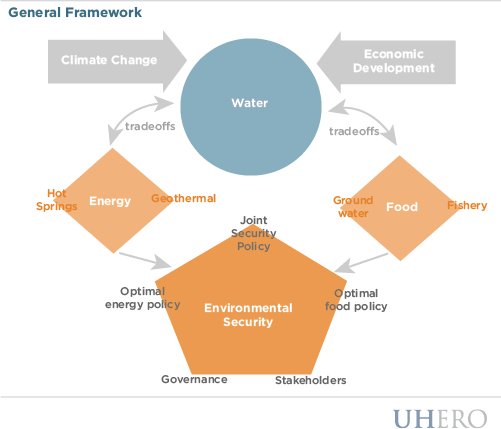This month, UHERO’s Project Environment will be commencing a joint project with Japan’s Research Institute for Humanity and Nature (RIHN). Climate change and economic development are causing increased pressure on water, energy and food resources, presenting communities with increased levels of tradeoffs and potential conflicts among these resources. The water-energy-food nexus is one of the most important and fundamental global environmental issues facing the world. As water is the central matter within this cluster, we will focus on the inherent tradeoffs between water and food, and water and energy.
We will take a regional perspective to address these global environmental problems. The geological and geomorphological conditions in our study area (Japan, Philippines, and Thailand) are heavily influenced by the so-called “Ring of Fire” around the Pacific Ocean. Within these areas, the hydro-meteorological conditions are dominated by the Asia monsoon. The populations that live under these natural conditions face elevated risk and potential disaster as negative impacts, while also benefitting from positive ecological goods and services. There are numerous tradeoffs and conflicts within the water-energy-food nexus, as well as among various stakeholders in the region. The objective of this project is to maximize environmental security by choosing management structures and policies that optimize both the water-food and water-energy connections in Asia-Pacific coastal regions.
The general resource management framework developed in this 5-year project will be relevant and replicable in all regions facing accelerated development and climate change, including Hawaii. Specific case studies in Japan include an investigation into the economic and environmental tradeoffs involved in local hot springs and a proposed geothermal development (water-energy), as well as the tradeoffs between groundwater use and a local fishery (water-food). Policy implications derived from this work would be useful to resource managers, planners, and other decision makers around the world.
Lead Institution: Research Institute for Humanity and Nature
– Kimberly Burnett




